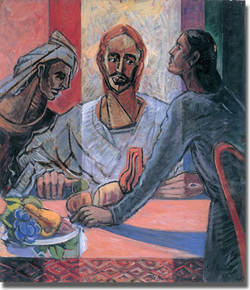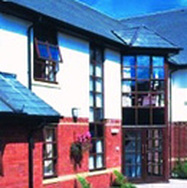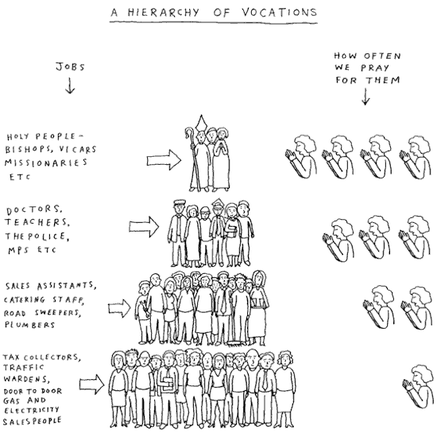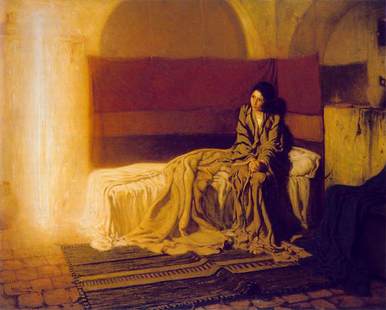 A lot of my work as Young Families Worker revolves around food! People love to eat and, regardless of age, they meet in the different groups, chat, play, worship and EAT. Perhaps you have given up a type of food for Lent? Easter is a time to remember the last supper and to celebrate the risen Christ on Easter Day. Families and friends often get together over this festival to eat. Jesus throughout his ministry ate with anyone who would have him, identifying with them and accepting them for who they were. Sharing his love, peace and knowledge of God with those around him. Through the ordinary act of sharing food, friendships can be made and strengthened: God’s love can be passed on. May God grant us the courage to talk about his love and friendship in the ordinary tines in life, perhaps when we are sharing food with one another. Andrea Ellams Young Families Worker  In February I attended a meeting in Preston entitled ‘expanding our horizons in respect of Methodist schools’. The Methodist Church has always believed in the importance of education for all individuals. You may not know that the Methodist Church now has 65 state funded schools in England, although none of them are in Cheshire. Many of these schools are in the most deprived areas of the country. All the schools have a Christian foundation and serve their local community including students of all faiths, or none. In England there is a huge change taking place in the provision of education with a significant reduction in the role of the local authority. The last Labour Government introduced Academies which were formed from schools which were deemed to be failing. These schools required significant investment from sponsors, and were often given new buildings, changes in leadership and a new ethos. The sponsors may or may not have previous experience in education. Schools that are in the most deprived areas are often the ones that are deemed to be failing. If this is a church school and the church is unable to continue to sponsor the school then it will be allocated a different sponsor and will lose its Christian ethos. The present Coalition Government has extended the academy programme with the Academies Act in 2010. Outstanding or Good schools were invited to convert to academy status, and now all schools who are ‘performing well’ can apply for academy status. There is also the opportunity for Free Schools to come into existence, which could be new schools built to fulfil a need in a particular area. The message from the Department for Education seems to be not if schools will convert, but when. So, what difference does this make? The academy receives funding directly from the Department for Education, and loses most of the support previously provided by the local authority. The school sponsor can purchase support from providers other than the local authority. The school sponsor is held accountable for the progress that is made by the students in the academy. There are many secular groups who are prepared to sponsor academies. We need to ask ourselves, as The Methodist Church, where we want to stand in this new landscape of providers? John Wesley saw the provision of Day Schools (in addition to Sunday Schools) as part of the mission of the church. The Methodist Church has always been at the forefront of education, often providing education for the most deprived in society, raising personal expectations and life chances. The development of academies and Free Schools could therefore be seen as an opportunity to further the mission of the church through its work in education. At the meeting we had long discussions about the role that The Methodist Church should take in our new landscape. Should we attempt to become important players in academies and free schools, although their formation may well be against the principals of many Methodists! If we ignore education then are we allowing our schools to become completely secular? Should we actively be seeking out gaps in education provision, and exploring opportunities for ecumenical partnerships? Is this a useful vehicle for our overall mission, especially where more disadvantaged communities exist? Or where the local authority is closing small village schools, might we be pro-active in making proposals to the pressure groups opposing the closures. Alternatively should we be discussing with local authorities or government specific roles The Methodist Church could play in looking for new schooling solutions? These are some of the issues that The Methodist Council and Conference will be discussing over coming months. Please hold them in your prayers as these discussions take place. John Wesley told the first Methodist teachers to always remember that ‘an ounce of love was worth a pound of knowledge’ and his challenge to teacher and pupil alike was this: ‘Do all the good you can By all the means you can In all the ways you can In all the places you can At all the times you can To all the people you can As long as ever you can.’ Patricia Barnard  On Monday 13th February, I had the opportunity to talk with some of your members of Frodsham Methodist Church about the recent changes at Chapel Fields Care Home. In October 2011, Chapel Fields became part of Methodist Homes (MHA), one of the largest UK charities dedicated to improving the lives of older people. As you can imagine, this is an exciting period of change for us. I have recently been employed as the Volunteer Co-ordinator for the Home. This is a completely new programme, but we are looking to build up a strong team who will support staff members to enhance the daily lives of our residents. We are looking to gain support with fundraising, gardening, daily activities (such as board games, quizzes, etc.), as well as special events that we hold throughout the year. Just as important is sharing a chat and perhaps a cup of tea with a resident. Even one hour per month will make a huge difference! We now have our own Music Therapist who works with our residents every Monday. Our Music Therapist offers individual and group therapy to meet the emotional and psychological needs of our residents, in a way that promotes their self-esteem and freedom of choice in order to pursue a better quality of life. The Home is currently working closely with the Alzheimer’s Society to raise awareness about dementia. On Tuesday 22nd May, during Dementia Awareness Week, Chapel Fields Care Home will be hosting a special afternoon tea party. This event will be open to anyone who is affected by dementia. The Alzheimer’s Society will be on hand to offer easy access support and information. The drop-in event starts at 2.30pm until 4.30pm on Tuesday 22nd May. We are also working with Age UK to organise regular activities within the home. We are also in the process of recruiting our own Chaplain who will add to our current spiritual services already in place. MHA is based on the Christian principles of love, compassion and respect, offering residents the opportunity to express their faith. Therefore it is vital that Chapel Fields renews its relationships with all of the local churches. In doing this, we strive to achieve greater communication and interaction as we look forward into this exciting new chapter at Chapel Fields. If you are interested in any of our volunteering roles, then we would love to hear from you. Please contact me at the home on 01928 734743 or e-mail [email protected]. For more information about MHA’s other projects nationwide, visit www.mha.org.uk, call 01332 296 200 or e-mail [email protected]. Ella Popper Volunteer Co-ordinator  “I missed out on my childhood and teenage years because my Dad was ill and I had 6 brothers and sisters so it was hard for my Mum to cope. I got in with the wrong people and became trapped in a cycle of addition, coming clean and relapsing. It’s a sort of torture. When I came to Emmaus I realized how much support there was. I like the fact that everyone here is working to keep their own home going. It is a joint enterprise. I do electrical work and I’ve learnt quite a bit, checking out that things are working and doing PAT testing. I came up with the idea of stripping down appliances that can’t be mended and recovering the metal and copper wiring. We make money from the salvaged metal and save on landfill. Emmaus has given me a purpose, stability and shelter. It’s given me back some sort of control of my life. I’ve built up trusting relationships with the guys here. I met a couple of friends recently. They saw me three years ago when I was gaunt and thin from drug abuse. They didn't recognize me. I feel it’s quite an honour to be involved in a worldwide movement.” Please support the work of Emmaus and pray that their communities will continue to help those who find themselves homeless and without hope. Jim Caldwell Dear Friends,
Over the last six weeks we have journeyed through Lent and heard or read passages from the Old Testament. These have included the story of God’s covenant with Noah, His promise to Abraham and Sarah, the giving of the Ten Commandments, His guidance for Moses as he lead the Israelites to the Promised Land, God’s promise to Jeremiah of a new covenant and the Servant passage from Isaiah. These stories remind us that from the very beginning of time God had a plan for His people. This plan was fulfilled through the life, death, resurrection and ascension of His Son Jesus Christ. “If you have been raised with Christ, seek the things that are above, where Christ is, seated at the right hand of God. Set your hearts on things that are above, not things that are on earth.” (Colossians 3: 1-2) As we journey through Holy Week there are opportunities to gather as God’s people to remember and ponder the sacrifice that Jesus made for each of us. On the evening of Palm Sunday we will walk the stages of the cross at Pant Asaph in North Wales. Our Tenebrae Service will be held on Maundy Thursday at which a simple meal is eaten, Holy Communion shared and the story of the Passion is read in candlelight. On Good Friday we join the ecumenical Walk of Witness to the top of Frodsham Hill. It is there that on Easter morning we resume our prayers before sharing breakfast together in the church hall. Following this there will be two services; 09.30LIVE! is our family friendly service and this will be followed at 10.45am by an our Easter celebration of Holy Communion. Details and times of all these events are to found elsewhere in the magazine. I pray that as we journey with Jesus entering into Jerusalem on Palm Sunday and all that leads him to the cross on Good Friday we may understand that Christ did this for each of us. And may we all have the joy and awe of that first Easter morning shining in and around our lives. Yours in Christ, Pat  In his first letter to the Gentiles of Asia Minor, who at the time were suffering religious persecution, St. Peter offers advice counselling steadfastness and perseverance. In I Peter Chapter 2, Verse 9 he writes “You are a chosen race, a royal priesthood, a holy nation, God’s own people, in order that you may proclaim the mighty acts of him who called you out of darkness into his marvellous light.” It is easy to glance over such passages thinking ‘they do not apply to me’ as the language appears deeply exclusive talking of an chosen race and language like ‘priesthood’ has come to refer to those called to a particular vocation: ordained ministry in the Church. As in the cartoon, we certainly seem to pray for certain people and their ministry more than others. But St. Peter is actually talking of the gift and call of the Baptism of all believers. This is of course not to say that presbyters do not have particular gifts and talents that suit them to that ministry, but that they are not somehow ‘special’. I recall the Methodist theologian C. K. Barrett preaching on this text once commenting that all the presbyters he had ever met had had noses, but so, in fact, had every person he had ever met. In what at the time was a ground-breaking document, All are Called published in 1985, the Church of England Board of Education commented because all human beings are made in the image of God, they are called to become the People of God, the Church, servants and ministers and citizens of the Kingdom, a new humanity in Jesus Christ. Though we are tainted by our sinfulness, God’s wonderful grace and love offer us all this common Christian vocation. God leaves everyone free to refuse this call; but the call is there for all without exception. All the Christian Churches in Britain continue to be tainted by the arguments and discussions over the place of women and homosexuals in ministry, and this topic has again been in the news recently. However St. Peter is clear all Christians are called to work for the enlarged realisation of the Kingdom of God. This begins in the Church but extends to the family, to the workplace and to the community. The young are called, the elderly are called, the healthy are called, the sick are called, those who work for the Church are called and those who work in local government or as car salespeople are called. All are called. Of course caution has to be exercised when we use this term ‘vocation’ and the Chair of the West Yorkshire District of The Methodist Church, Rev’d. Dr. Roger Walton, has a salient remainder in his recent book The Reflective Disciple: In a society where some work is still exploitative and some experiences of ordinary living are degrading, we need to be careful before baptizing everyone’s daily experience with the word vocation, simply because they are disciples. That does not mean that in any of those settings one cannot carry a sense that one is there to work with God, perhaps especially to express love and support, to resist dehumanising, to seek for justice or simply to offer a smile to help strugglers survive. In much discussion of vocation the emphasis is on choosing a path, a role or career to serve God but the only choice open for some people may be how, not whether, to live in this way. Vocation in this context is the fundamental vocation of all Christians to be with God and in practice will mean owning that it is a place where God shares people’s experience and wants us with him to bring some light and hope. The imprisonment of the Kingdom of God to a Sunday or to Church is an attempt to restrict the description of God’s activity to the ecclesiastical sphere of our lives. Christ the King is Lord of the entire world and, as the Good Shepherd, cares for all its people. Vocations Sunday is marked in most churches on the fourth Sunday after Easter and this year falls on 29th April. It is not just an opportunity for Christians to think about what functions they perform in the Church they attend, but it is an opportunity also to reflect on how in simple ways and through everyday experiences they can share something of Christ with others. Matthew With thanks to Mr. Dave Walker of Cartoon Church for kind permission to re-produce the cartoon A Hierarchy of Vocations.  The Annunciation, the event recorded in the first chapter of Luke’s gospel when an angel appeared to Mary and told her that she was to give birth to a son and that she was to call him Jesus, is celebrated by many Christians on 25 March, a full nine months before Christmas day. It is one of the most frequent occurrences in mediaeval and renaissance Christian art and features in the work of artists such as Botticelli, da Vinci and Caravaggio as well as in the décor of many church buildings. The African American painter Henry Ossawa Tanner (1859-1937) is now little remembered, his most enduring legacy perhaps being Sand Dunes at Sunset which was the first painting by an African American artist to enter the permanent collection of the White House which happened during the Clinton administration. His father was a minister in the African Methodist Church and Tanner became known for his paintings on religious themes. His The Annunciation painted in 1898 exudes the intensity and warmth of a sudden religious experience and is arguably one of the most striking paintings of the last century or so on this subject. It is often said that Methodism was habitually squeamish when it came to discussing the role of Mary, perhaps because it was thought a little too high church for some tastes! But in the interests of ecumenism, we have a lot to learn from Mary—especially as we look to the Annunciation—in terms of discipleship and following Christ. Christian discipleship is the process by which followers grow in the Lord Jesus and are equipped by the Holy Spirit to become more Christ-like. And as Acts puts it, discipleship is a continuing process and day by day the Lord adds to the ‘number those who are being saved’. We learn from Luke that Mary responds to the angel by saying ‘Here I am, the servant of the Lord; let it be with me according to your word’. John Wesley notes that Mary’s humble faith, consent and expectation might well have been the time of her conceiving. Mary was invited to say ‘yes’ to the Lord in a most extraordinary way and of course we do not all experience such phenomena as that depicted by Tanner. But this same challenge is made to us in those unique moments in life when we are conscious of being invited to say ‘yes’ to God’s will in something important; perhaps life changing, perhaps every day. As the Methodist Covenant prayer puts it we are provoked to say ‘I am no longer my own but yours. Put me to what you will…I freely and wholeheartedly yield all things to your pleasure and disposal. And now, glorious and blessed God, Father, Son and Holy Spirit, you are mine and I am yours.’ A challenge to us all indeed, but visited with the Holy Spirit and overshadowed by God’s power, we are strengthened to walk with Mary the joyful path of obedience and to say ‘yes’ to God’s calling. Amen. Matthew |
Pastoral LettersWritten by the Minister & Members
|

 RSS Feed
RSS Feed